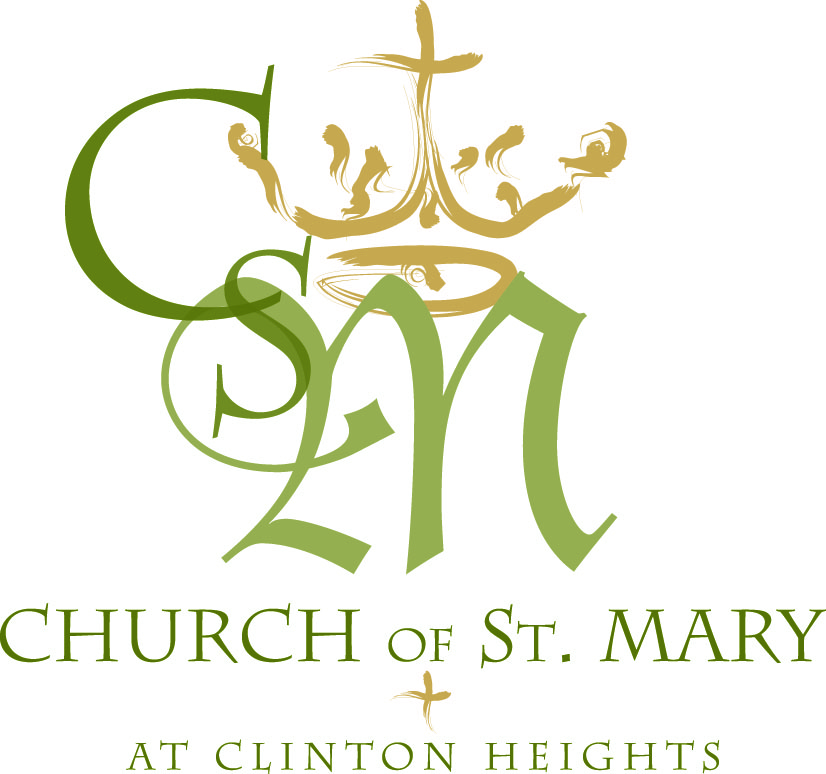April 19, 2020 Second Sunday of Easter – Sunday of Divine Mercy Worship Aid
The Widow’s Mite
The two coins of today’s Gospel were equal to a social security check today. The widow gave everything she had for God and didn’t look back. She is a wonderful example for us. Our normal tendency is to give our extra; not from what we need. It is easy to fall into the habit of giving only the spare change out of our pockets. The spare change can be our time and talent as well as our money. I am a firm believer that God gives each parish community all it needs to do ministry and be active disciples. The widow reminds us that there is no gift or talent that is too small. Each person in the parish has something to offer for the good of the community. We are all vitally needed to spread the message of Jesus and to be His Body in the world. May we follow the example of the widow and give all we have to God and for His people
Pro Patria: A Homily Fifty Days Before the Election
Pro Patria: A Homily Fifty Days Before the Election
by Monsignor James P. Moroney, Rector, St. John’s Seminary, Boston MA
Sunday, September 18, 2016
(click here for a downloadable PDF of this post.)
Despite the fact that it was illegal for a Catholic to vote, hold office or practice his religion in public, the Catholic gentleman Charles Carroll of Carrollton, Maryland signed the Declaration of Independence in 1776. Thirteen years later, his cousin John was named the first Catholic Bishop in this land, a man who, by any historian’s assessment, is to be counted among the founding fathers of these United States.
Yet, despite the advocacy for the new American nation which Bishop Carroll embraced (so passionately that it once got him excommunicated as a young priest), or perhaps because of it, he followed three cardinal rules which governed his actions at the intersection of priesthood and patriotism:
- The government and her laws are to be obeyed, unless they would cause us to sin. Here he, like the Catechism of the Catholic Church, might have cited a late second century Greek apologist: “Pay to all of them their dues, taxes to whom taxes are due, revenue to whom revenue is due, respect to whom respect is due, honor to whom honor is due.”1
- All American citizens have an obligation to participate in the civic life, in order to foster, as our first President put it, “a brotherly affection and love for one another, for their fellow Citizens of the United States at large, and particularly for their brethren who have served in the field, and finally, that [God] would most graciously be pleased to dispose us all, to do justice, to love mercy, and to demean ourselves with that charity, humility, and pacific temper of mind which were the characteristics of the divine author of our blessed religion, and without an humble imitation of whose example in these things, we can never hope to be a happy nation.”2
- No priest should ever publicly endorse the candidacy of a single person or party. Though Bishop Carroll was a close personal friend of Benjamin Franklin, neither Adams nor Jefferson ever received his public endorsement.
That was Bishop Carroll’s vision for America as patriot and priest: an America established by the will of God through the work of our founding fathers.3 And this was his vision of the Church in America: “to grow with the growth and bloom with the development of the country,”4 serving as a leaven in the dough of the great American experiment by promoting the Gospel virtues of true religion.
And we are the inheritors of this great vision, though at times in these difficult days, we seem a long way from making that vision come true.
A long way even from realizing our Bishops’ common guidance in their latest letter to us, Forming Consciences For Faithful Citizenship, wherein they counsel Catholics approaching the voting booth to act on “moral convictions of a well-formed conscience”5 on such vital issues as human life, promoting peace, marriage and family life, religious freedom, preferential option for the poor and economic justice, health care, migration, Catholic education, promoting justice and countering violence, combatting unjust discrimination, care for our common home in the face of climate change, communications, media and culture, and global solidarity.6
All towards making a decision on which candidate to vote for. Now it is always possible that, in any given election, all the candidates will espouse Catholic values. In which case our decision is hard.
But then it is also possible, in any given election, that one or even all candidate might promote policies which contradict the truth we proclaim as Catholics. And that decision is even harder.
Say, for example, that we are faced with a candidate who promotes intrinsically evil acts, like abortion or euthanasia. This alone, the Bishops tell us, “provides sufficient reason to vote for the other candidate.”
But even more sadly, what if we are faced with an election in which “all candidates hold positions that promote intrinsically evil acts?” Then, the Bishops advise, the Catholic voter might choose to vote for no one, “or, after careful deliberation, may decide to vote for the candidate deemed less likely to advance such a morally flawed position and more likely to pursue other authentic human goods.”7
But even faced with such awful choices, as Archbishop Chaput of Philadelphia reminded us last week, we cannot give in to the “luxury of cynicism.”
“If Christians leave the public square,” the Archbishop of Philadelphia said in a talk at Notre Dame, “other people with much worse intentions won’t. The surest way to make the country suffer is not to contest them in public debate and in the voting booth.”
And so, the Archbishop of Philadelphia, like the first Archbishop of Baltimore before him, refused to tell us how to vote. But he did tell us to honor our nation, and he did tell us how to participate in civic life.
Only one thing can show us how to vote, he suggested: Prayer. Prayer which, as he wrote elsewhere, “involves more than mumbling a Hail Mary before we pull the voting booth lever for someone we see as the lesser of two evils,” Prayer which “is a conversation, an engagement of the soul with God…We need to be awake, we need to clear our heads of media noise, and we need to think quietly and carefully before we vote. None of us can afford to live the coming weeks on autopilot.”
So you have exactly fifty days to pray. Without cynicism, sarcasm or snide condescension. With humility, an open heart and a love for the truth. Pray for the country which Bishop John Carroll so loved, and that by rendering unto God what is truly God’s, we might render rightly unto Caesar as well.
_____________________
1Ad Diognetum 5: 5, 10.
2 George Washington, “Circular Letter Addressed to the Governors of All the States on Disbanding the Army,” June 8, 1783.
3 Cardinal Gibbons on Bishop Carroll, quoted in John F. Fink, Patriotic Leaders of the Church. (Our Sunday Visitor, 2004) page 37.
4 Ibid., p 37.
5 United States Conference of Catholic Bishops, Forming Consciences for Faithful Citizenship. (USCCB Publications, 2016) [FC], no. 14.
6 Cf. FC, no. 13.
7 FC, no. 36.
Gaudete: St. Teresa of Calcutta
At 10:30 am on September 4th, XXIII Sunday in Ordinary Time, the Holy Father Francis celebrated in Saint Peter’s Basilica Holy Mass with Rite of Canonization of Blessed Teresa of Calcutta (1910-1997, nee Gonxha Agnes Bojaxhiu), Religious foundress of the Congregation of the Missionaries of Charity and the Missionaries of Charity.
Published here is the text of the Pope’s homily delivered during the Mass:
“Who can learn the counsel of God?” (Wis 9:13). This question from the Book of Wisdom that we have just heard in the first reading suggests that our life is a mystery and that we do not possess the key to understanding it. There are always two protagonists in history: God and man. Our task is to perceive the call of God and then to do his will. But in order to do his will, we must ask ourselves, “What is God’s will in my life?”
We find the answer in the same passage of the Book of Wisdom: “People were taught what pleases you” (Wis 9:18). In order to ascertain the call of God, we must ask ourselves and understand what pleases God. On many occasions the prophets proclaimed what was pleasing to God. Their message found a wonderful synthesis in the words “I want mercy, not sacrifice” (Hos 6:6; Mt 9:13). God is pleased by every act of mercy, because in the brother or sister that we assist, we recognize the face of God which no one can see (cf. Jn 1:18). Each time we bend down to the needs of our brothers and sisters, we give Jesus something to eat and drink; we clothe, we help, and we visit the Son of God (cf. Mt 25:40). In a word, we touch the flesh of Christ.
We are thus called to translate into concrete acts that which we invoke in prayer and profess in faith. There is no alternative to charity: those who put themselves at the service of others, even when they don’t know it, are those who love God (cf. 1 Jn 3:16-18; Jas 2:14-18). The Christian life, however, is not merely extending a hand in times of need. If it is just this, it can be, certainly, a lovely expression of human solidarity which offers immediate benefits, but it is sterile because it lacks roots. The task which the Lord gives us, on the contrary, is the vocation to charity in which each of Christ’s disciples puts his or her entire life at his service, so to grow each day in love.
We heard in the Gospel, “Large crowds were traveling with Jesus” (Lk 14:25). Today, this “large crowd” is seen in the great number of volunteers who have come together for the Jubilee of Mercy. You are that crowd who follows the Master and who makes visible his concrete love for each person. I repeat to you the words of the Apostle Paul: “I have indeed received much joy and comfort from your love, because the hearts of the saints have been refreshed through you” (Philem 1:7). How many hearts have been comforted by volunteers! How many hands they have held; how many tears they have wiped away; how much love has been poured out in hidden, humble and selfless service! This praiseworthy service gives voice to the faith it gives voice to the faith! and expresses the mercy of the Father, who draws near to those in need.
 Following Jesus is a serious task, and, at the same time, one filled with joy; it takes a certain daring and courage to recognize the divine Master in the poorest of the poor and those who are cast aside, and to give oneself in their service. In order to do so, volunteers, who out of love of Jesus serve the poor and the needy, do not expect any thanks or recompense; rather they renounce all this because they have discovered true love. And each one of us can say: “Just as the Lord has come to meet me and has stooped down to my level in my hour of need, so too do I go to meet him, bending low before those who have lost faith or who live as though God did not exist, before young people without values or ideals, before families in crisis, before the ill and the imprisoned, before refugees and immigrants, before the weak and defenseless in body and spirit, before abandoned children, before the elderly who are on their own. Wherever someone is reaching out, asking for a helping hand in order to get up, this is where our presence and the presence of the Church which sustains and offers hope must be”. And I do this, keeping alive the memory of those times when the Lord’s hand reached out to me when I was in need.
Following Jesus is a serious task, and, at the same time, one filled with joy; it takes a certain daring and courage to recognize the divine Master in the poorest of the poor and those who are cast aside, and to give oneself in their service. In order to do so, volunteers, who out of love of Jesus serve the poor and the needy, do not expect any thanks or recompense; rather they renounce all this because they have discovered true love. And each one of us can say: “Just as the Lord has come to meet me and has stooped down to my level in my hour of need, so too do I go to meet him, bending low before those who have lost faith or who live as though God did not exist, before young people without values or ideals, before families in crisis, before the ill and the imprisoned, before refugees and immigrants, before the weak and defenseless in body and spirit, before abandoned children, before the elderly who are on their own. Wherever someone is reaching out, asking for a helping hand in order to get up, this is where our presence and the presence of the Church which sustains and offers hope must be”. And I do this, keeping alive the memory of those times when the Lord’s hand reached out to me when I was in need.
Mother Teresa, in all aspects of her life, was a generous dispenser of divine mercy, making herself available for everyone through her welcome and defense of human life, those unborn and those abandoned and discarded. She was committed to defending life, ceaselessly proclaiming that “the unborn are the weakest, the smallest, the most vulnerable”. She bowed down before those who were spent, left to die on the side of the road, seeing in them their God-given dignity; she made her voice heard before the powers of this world, so that they might recognize their guilt for the crime the crimes! of poverty they created. For Mother Teresa, mercy was the “salt” which gave flavor to her work, it was the “light” which shone in the darkness of the many who no longer had tears to shed for their poverty and suffering.
Her mission to the urban and existential peripheries remains for us today an eloquent witness to God’s closeness to the poorest of the poor. Today, I pass on this emblematic figure of womanhood and of consecrated life to the whole world of volunteers: may she be your model of holiness! I think, perhaps, we may have some difficult in calling her “Saint Teresa”: her holiness is so near to us, so tender and so fruitful that we continual to spontaneously call her “Mother Teresa”. May this tireless worker of mercy help us increasingly to understand that our only criterion for action is gratuitous love, free from every ideology and all obligations, offered freely to everyone without distinction of language, culture, race or religion. Mother Teresa loved to say, “Perhaps I don’t speak their language, but I can smile”. Let us carry her smile in our hearts and give it to those whom we meet along our journey, especially those who suffer. In this way, we will open up opportunities of joy and hope for our many brothers and sisters who are discouraged and who stand in need of understanding and tenderness.
“Fire I came to cast on the earth!”
14 August 2016 20th Sunday of Ordinary Time Fr. David LeFort
[Since we hosted the annual Missionary Cooperative Appeal this past weekend, many have asked me to provide some greater insight into the Gospel of this Sunday, thus these simple reflections:]
Jesus said to his disciples: “I have come to set the earth on fire, and how I wish it were already blazing! There is a baptism with which I must be baptized, and how great is my anguish until it is accomplished! Do you think that I have come to establish peace on the earth? No, I tell you, but rather division. From now on a household of five will be divided, three against two and two against three; a father will be divided against his son and a son against his father, a mother against her daughter and a daughter against her mother, a mother-in-law against her daughter-in-law and a daughter-in-law against her mother-in-law.”
Judgment. Jesus is warning his followers of a coming judgment.
Repeatedly, his warnings force us to examine the implications of our commitments. Indeed, it is all too easy to make commitments in one area of life as though they did not affect other areas as well. Jesus warns that those who make a commitment to him will be persecuted, that a commitment of faith also means that our attitude toward material possessions must change, and that moral responsibilities must be taken with even greater seriousness.
Now, in this pericope, Jesus warns that persons who make a commitment to him will find their relationships with others, even those closest to them, affected by that commitment. We cannot make a commitment to Jesus Christ as Lord without its affecting the way we relate to friends and to family members. Because our commitment to Christ shapes our values, priorities, goals, and behavior, it also forces us to change old patterns of life, and these changes may precipitate crises in significant relationships.
Some of the most unexpected crises we face come from the opposition of others when we set out to do what we perceive to be the good, moral, and right thing to do. Jesus himself knew how devastating such crises can be, and he warned his followers to be prepared to encounter them as well.
- 1
- 2
- 3
- …
- 41
- Next Page »







